
awesome-ml-blogs
Curated list of technical blogs on machine learning · AI/ML/DL/CV/NLP/MLOps
Stars: 105
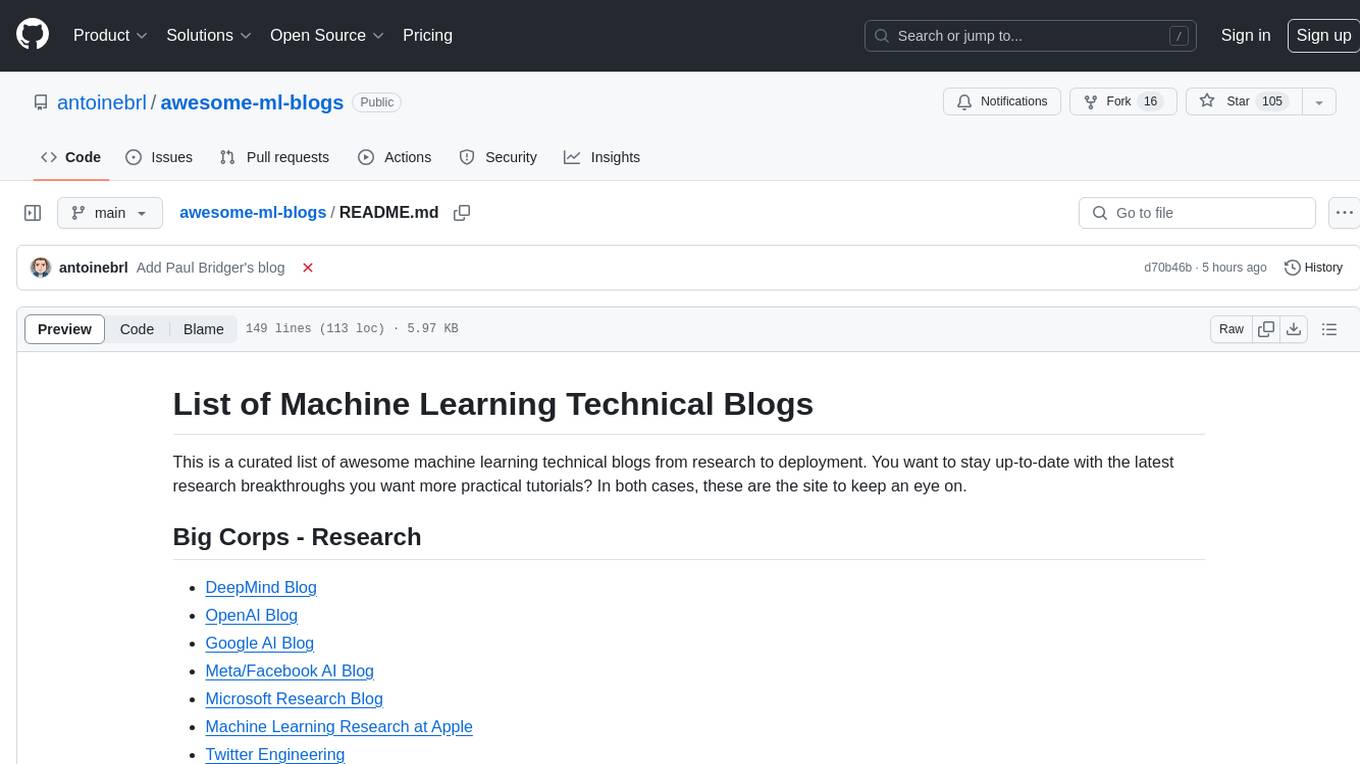
awesome-ml-blogs is a curated list of machine learning technical blogs covering a wide range of topics from research to deployment. It includes blogs from big corporations, MLOps startups, data labeling platforms, universities, community content, personal blogs, synthetic data providers, and more. The repository aims to help individuals stay updated with the latest research breakthroughs and practical tutorials in the field of machine learning.
README:
This is a curated list of awesome machine learning technical blogs from research to deployment. You want to stay up-to-date with the latest research breakthroughs you want more practical tutorials? In both cases, these are the site to keep an eye on.
- DeepMind Blog
- OpenAI Blog
- Google AI Blog
- Meta/Facebook AI Blog
- Microsoft Research Blog
- Machine Learning Research at Apple
- Twitter Engineering
- Amazon Science Blog
- OpenMined Blog
- AWS Machine Learning Blog
- NVIDIA - Deep Learning Blog
- Unity Blog on Machine Learning and AI
- Spotify Engineering
- Netflix TechBlog on Machine Learning
- Uber Engineering
- Lyft Engineering
- Intel AI Blog
- AirBnB Engineering, AI & ML
- DoorDash
- Google Technology
- Netptune.ai Blog
- ClearML Blog
- HuggingFace Blog
- DataRobot Blog
- OctoML Blog
- DVC Blog
- CometML Blog
- Roboflow Blog
- Floydhub Blog (closed)
- Dataiku Blog
- H2O.ai Blog
- Superwise.ai Blog
- Sicara Blog
- Clarifai blog
- Paperspace Blog
- MosaicML Blog
- V7 Blog
- Scale AI Blog (corporate)
- Snorkel AI Blog
- SuperAnnotate Blog
- Sama Blog
- Playment Blog
- Cord.tech Blog
- Dataloop Blog
- Superb AI blog
- annotell Blog
- iMerit Blog
- Kili Technology Blog
- LabelStudio
- LabelBox Blog
- Understand.ai Blog
- Lightly.ai Blog
- Alectio Blog
- Aquarium Learning Blog
- Siasearch Blog
- Humanloop blog
- Machine Learning at Berkeley
- The Berkeley Artificial Intelligence Research Blog
- ML@CMU
- Stanford DAWN
- The Stanford AI lab Blog
- MIT News ML and AI
- AutoML Group
- The Gradient
- Weights & Biases Blog
- Scale AI Exchange Blog
- KDNugget
- Towards Data Science
- Machine Learning Mastery
- Pytorch
- The Tensorflow blog
- Yoshua Bengio
- Sebastian Ruder
- Lil'Log
- inFERENCe
- Jay Alammar
- Chip Huyen
- Eugene Yan
- Erik Bernhardsson
- Otoro
- arg min blog
- FastML
- Carlos E.Perez
- Sander Dieleman
- Jeremy Jordan
- George Ho
- Paul Bridger
- Distill - Research Publications. No longer updated
- Kaggle Blog
- Brighter.ai Blog - Data anonymization
Your favorite piece is not listed here? Feel free to open an issue or a pull request. Alternatively, you can contact me @antbrl. Thanks for your contribution!
For Tasks:
Click tags to check more tools for each tasksFor Jobs:
Alternative AI tools for awesome-ml-blogs
Similar Open Source Tools

awesome-ml-blogs
awesome-ml-blogs is a curated list of machine learning technical blogs covering a wide range of topics from research to deployment. It includes blogs from big corporations, MLOps startups, data labeling platforms, universities, community content, personal blogs, synthetic data providers, and more. The repository aims to help individuals stay updated with the latest research breakthroughs and practical tutorials in the field of machine learning.
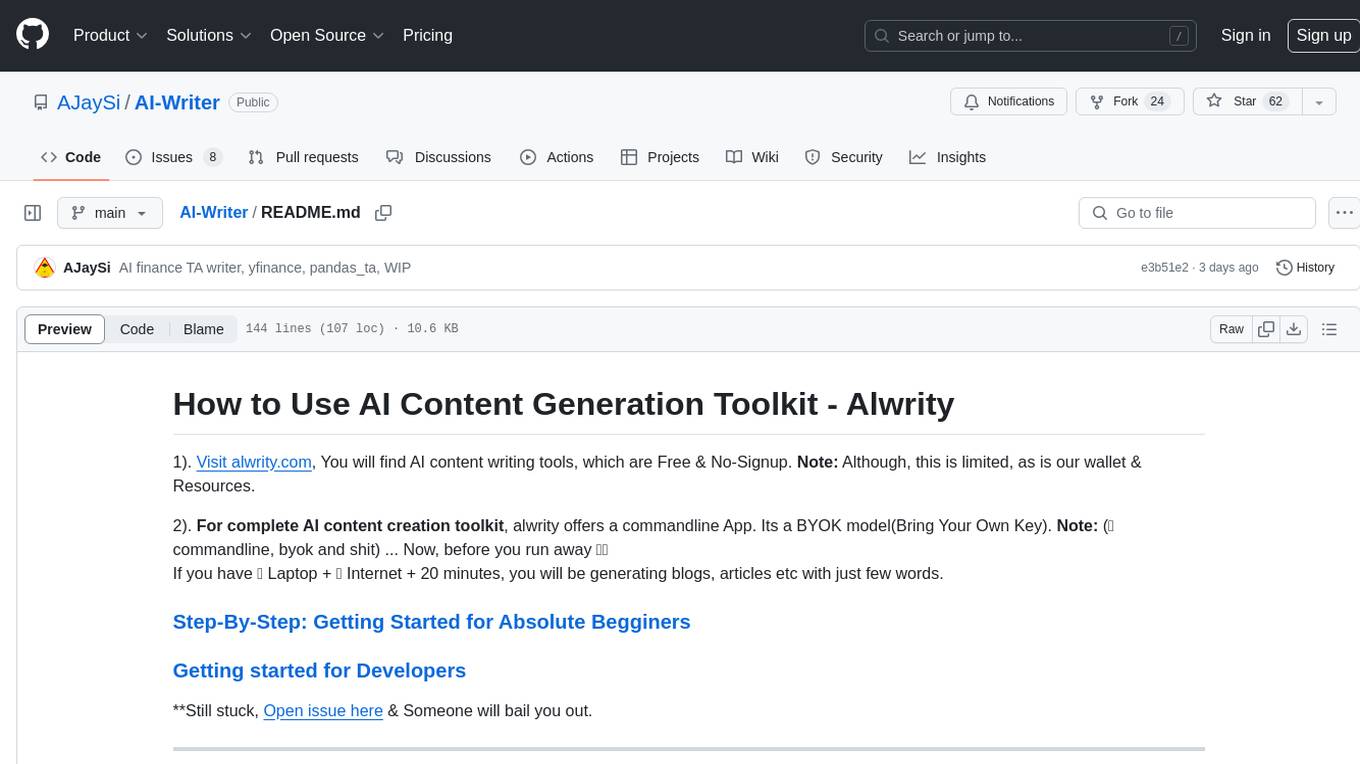
AI-Writer
AI-Writer is an AI content generation toolkit called Alwrity that automates and enhances the process of blog creation, optimization, and management. It integrates advanced AI models for text generation, image creation, and data analysis, offering features such as online research integration, long-form content generation, AI content planning, multilingual support, prevention of AI hallucinations, multimodal content generation, SEO optimization, and integration with platforms like Wordpress and Jekyll. The toolkit is designed for automated blog management and requires appropriate API keys and access credentials for full functionality.
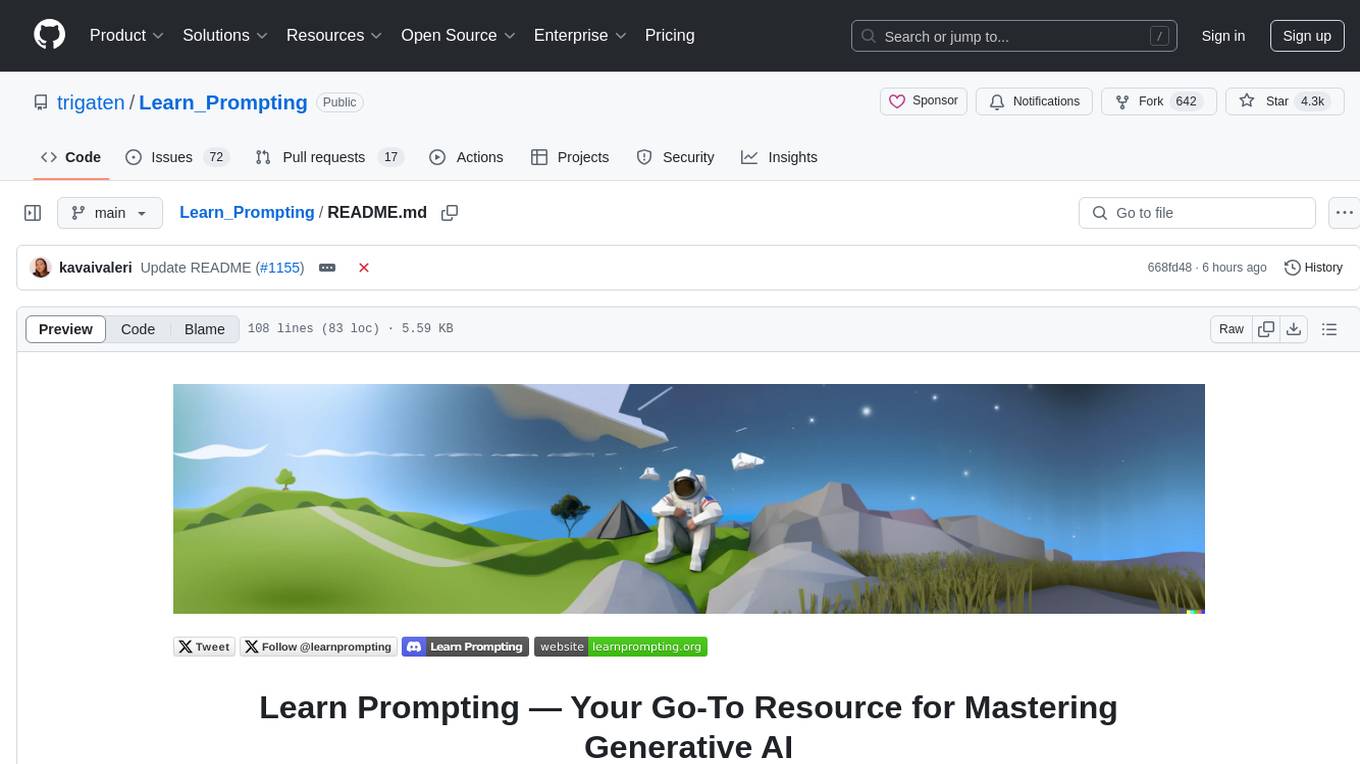
Learn_Prompting
Learn Prompting is a platform offering free resources, courses, and webinars to master prompt engineering and generative AI. It provides a Prompt Engineering Guide, courses on Generative AI, workshops, and the HackAPrompt competition. The platform also offers AI Red Teaming and AI Safety courses, research reports on prompting techniques, and welcomes contributions in various forms such as content suggestions, translations, artwork, and typo fixes. Users can locally develop the website using Visual Studio Code, Git, and Node.js, and run it in development mode to preview changes.
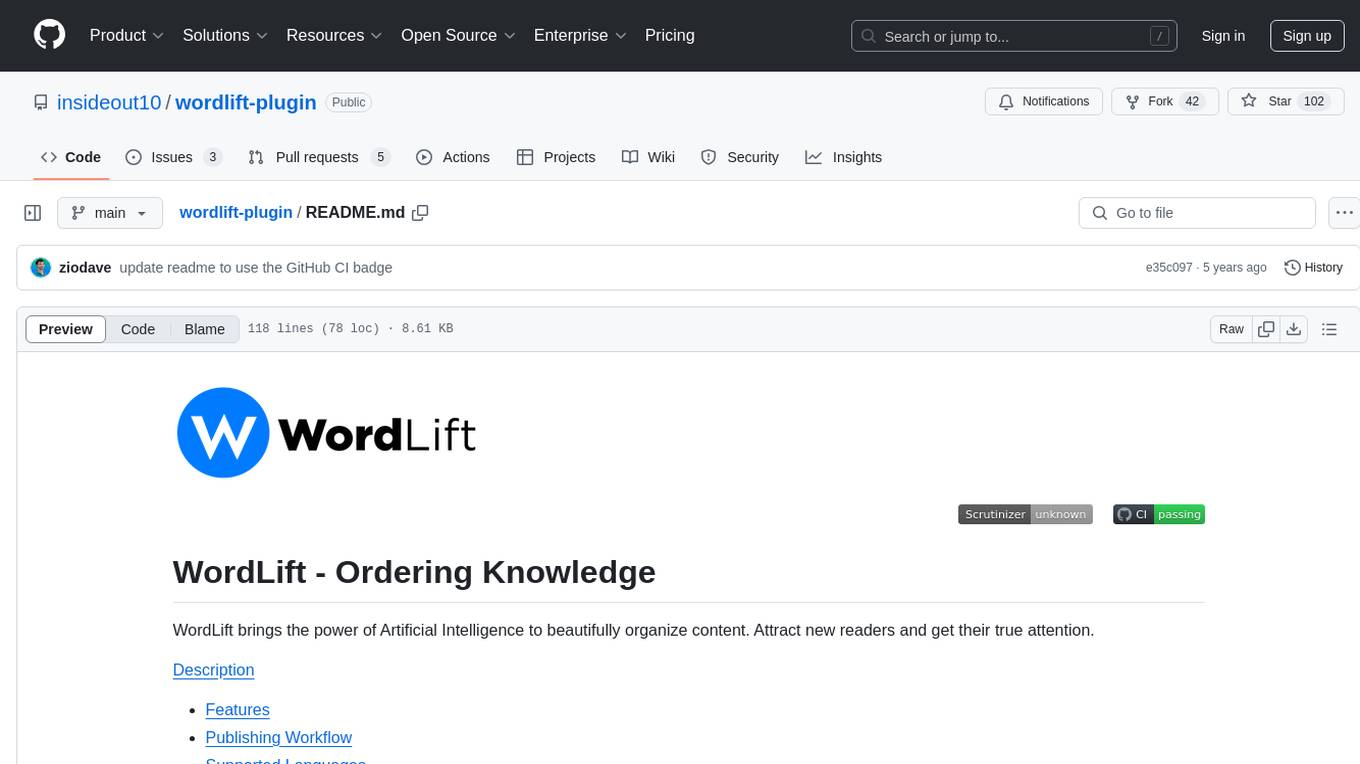
wordlift-plugin
WordLift is a plugin that helps online content creators organize posts and pages by adding facts, links, and media to build beautifully structured websites for both humans and search engines. It allows users to create, own, and publish their own knowledge graph, and publishes content as Linked Open Data following Tim Berners-Lee's Linked Data Principles. The plugin supports writers by providing trustworthy and contextual facts, enriching content with images, links, and interactive visualizations, keeping readers engaged with relevant content recommendations, and producing content compatible with schema.org markup for better indexing and display on search engines. It also offers features like creating a personal Wikipedia, publishing metadata to share and distribute content, and supporting content tagging for better SEO.
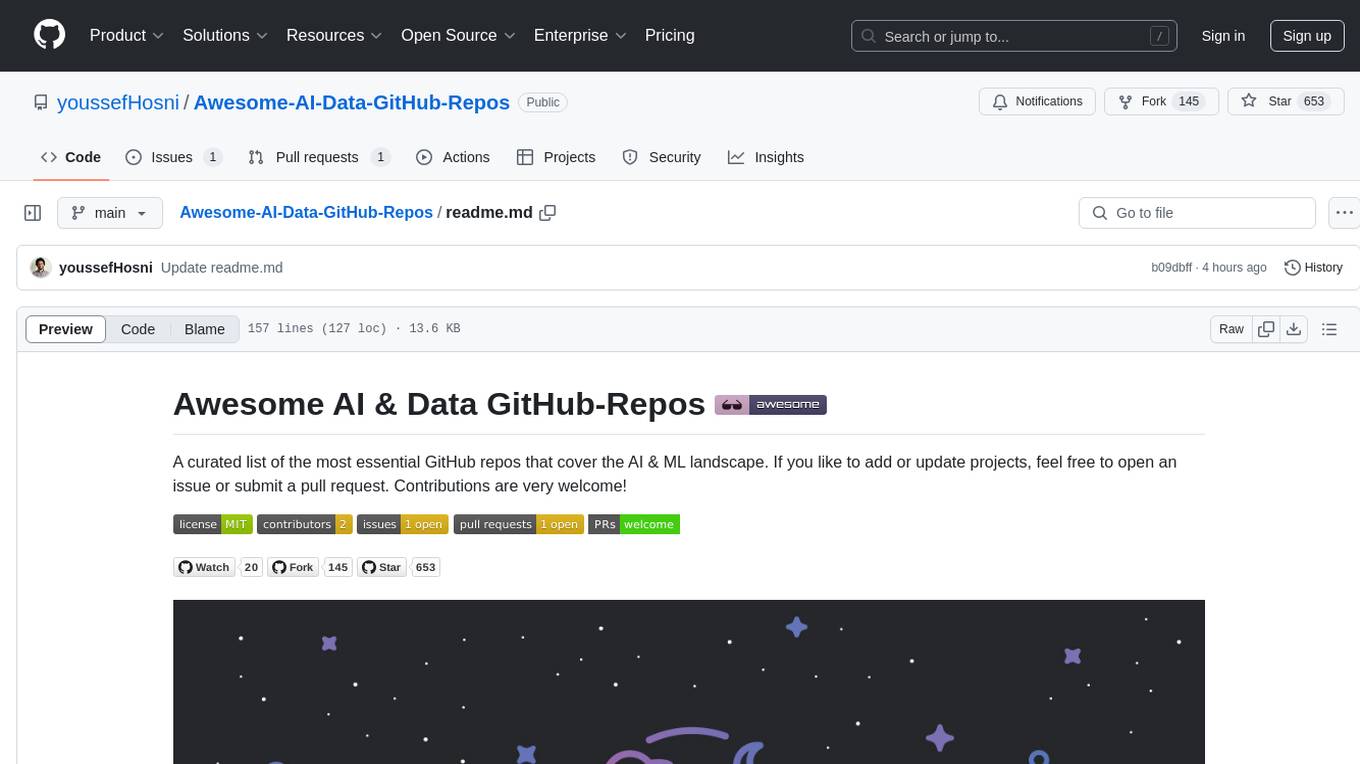
Awesome-AI-Data-GitHub-Repos
Awesome AI & Data GitHub-Repos is a curated list of essential GitHub repositories covering the AI & ML landscape. It includes resources for Natural Language Processing, Large Language Models, Computer Vision, Data Science, Machine Learning, MLOps, Data Engineering, SQL & Database, and Statistics. The repository aims to provide a comprehensive collection of projects and resources for individuals studying or working in the field of AI and data science.
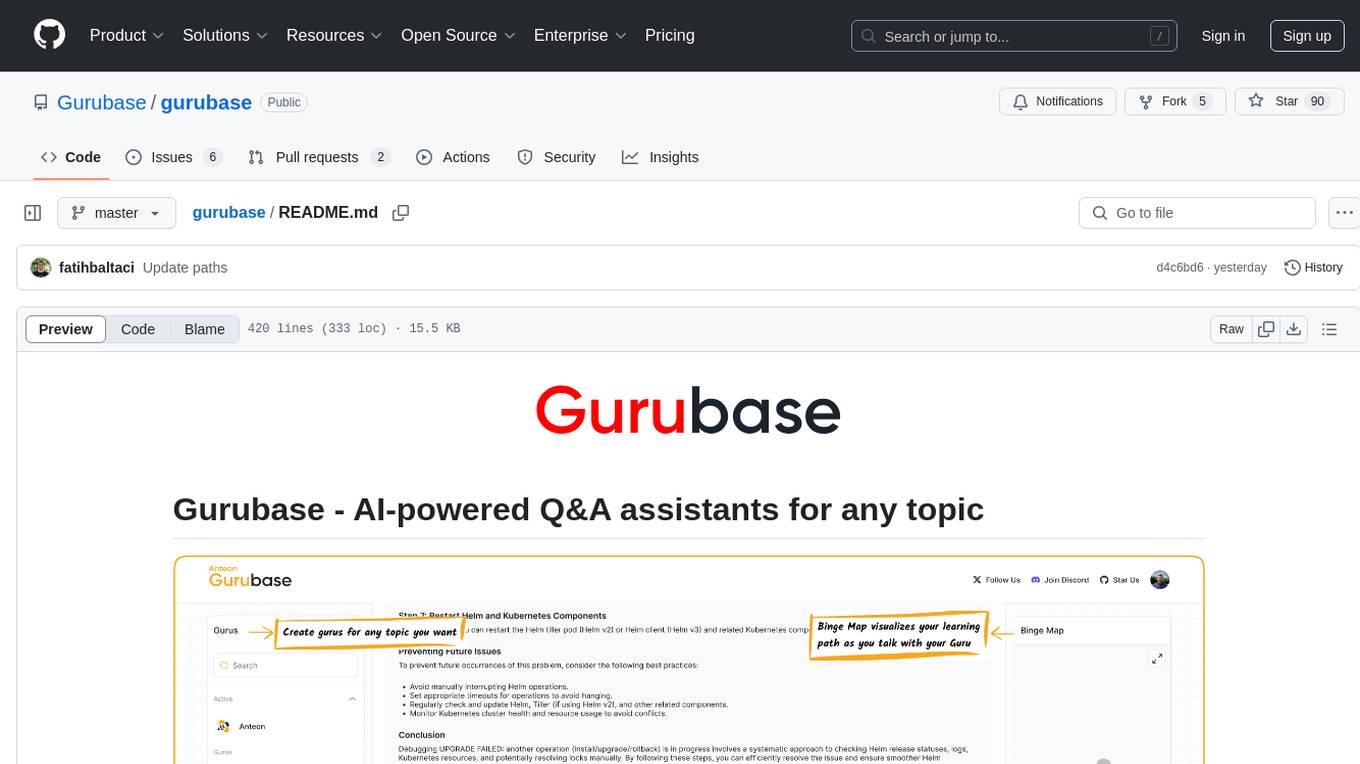
gurubase
Gurubase is an open-source RAG system that enables users to create AI-powered Q&A assistants ('Gurus') for various topics by integrating web pages, PDFs, YouTube videos, and GitHub repositories. It offers advanced LLM-based question answering, accurate context-aware responses through the RAG system, multiple data sources integration, easy website embedding, creation of custom AI assistants, real-time updates, personalized learning paths, and self-hosting options. Users can request Guru creation, manage existing Gurus, update datasources, and benefit from the system's features for enhancing user engagement and knowledge sharing.

awesome-ai-tools
This repository contains a curated list of awesome AI tools that can be used for various machine learning and artificial intelligence projects. It includes tools for data preprocessing, model training, evaluation, and deployment. The list is regularly updated with new tools and resources to help developers and data scientists in their AI projects.
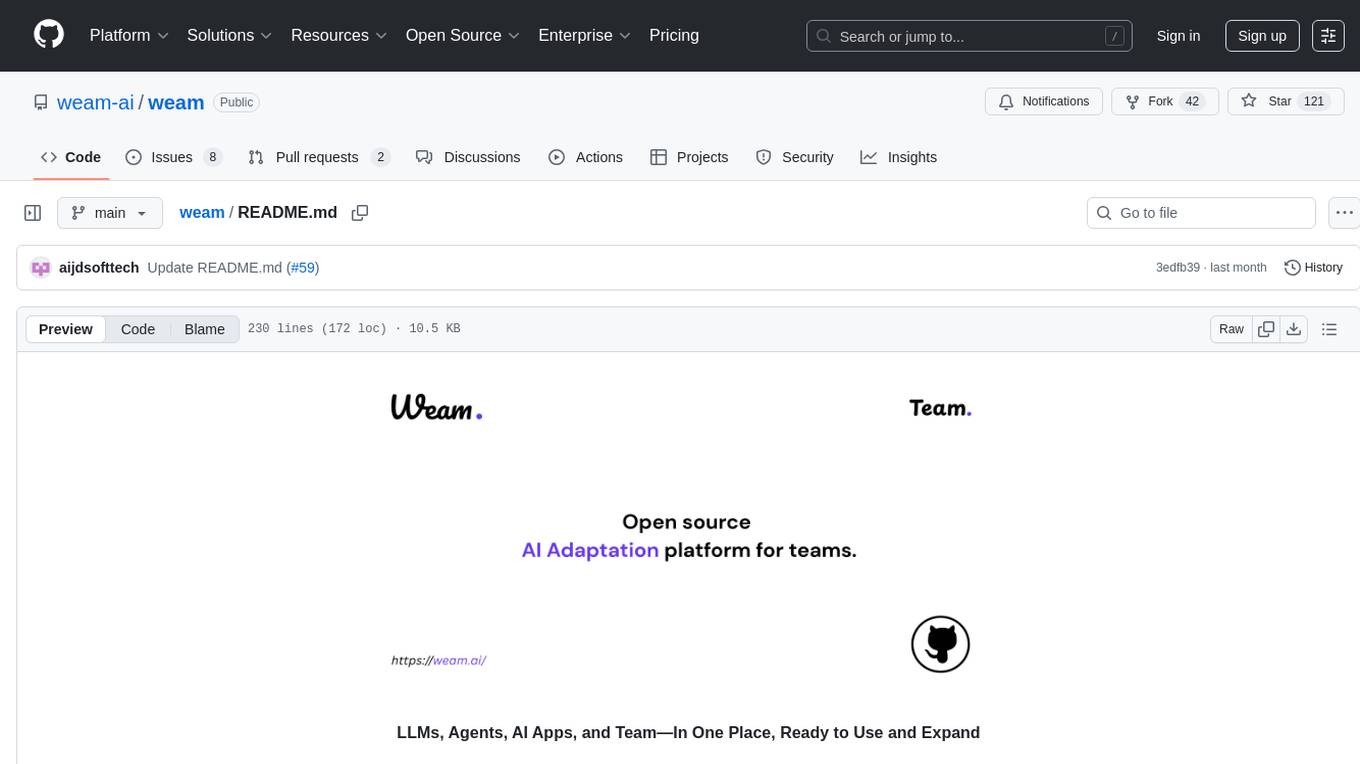
weam
Weam is an open source platform designed to help teams systematically adopt AI. It provides a production-ready stack with Next.js frontend and Node.js/Python backend, allowing for immediate deployment and use. Weam connects to major LLM providers, enabling easy access to the latest AI models. The platform organizes AI interactions into 'Brains' for different departments, offering customization and expansion options. Features include chat system, productivity tools, sharing & access controls, prompt library, AI agents, RAG, MCP, enterprise features, pre-built automations, and upcoming AI app solutions. Weam is free, open source, and scalable to meet growing needs.
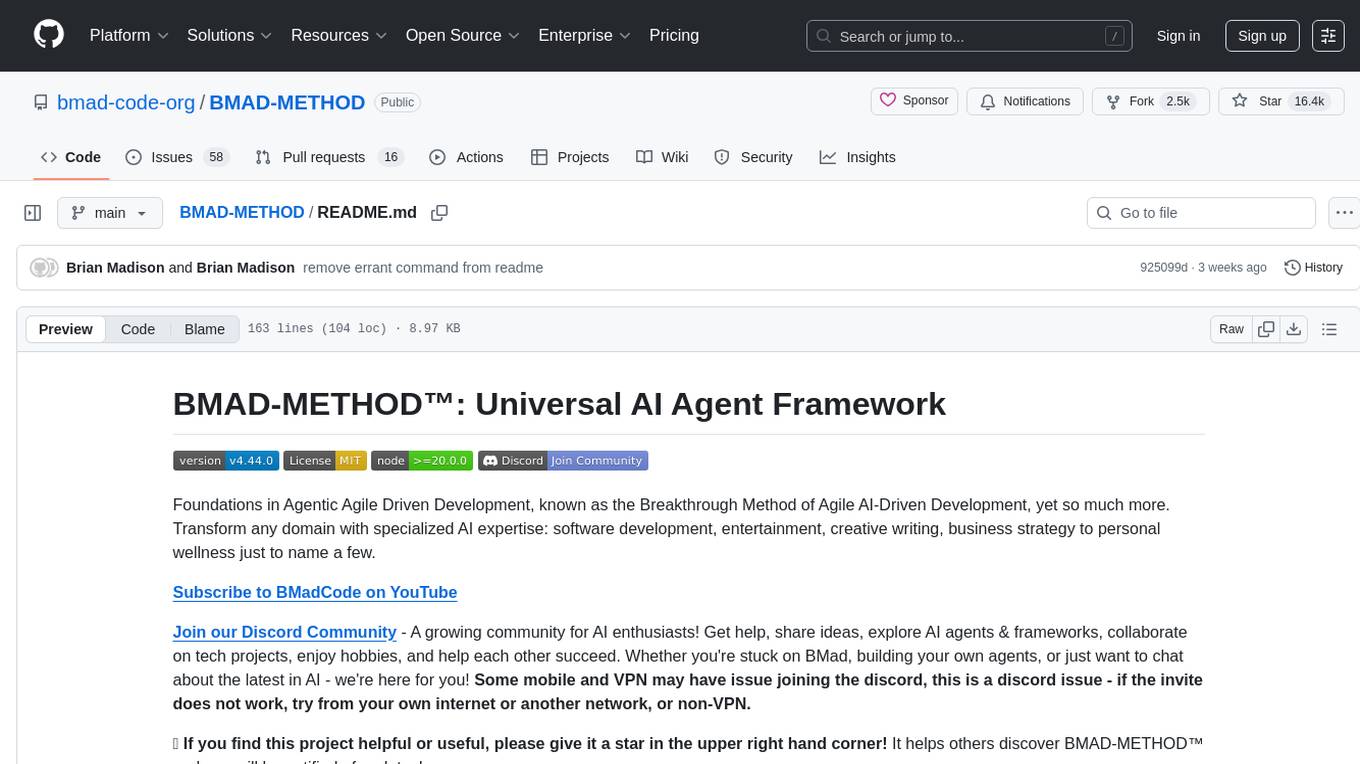
BMAD-METHOD
BMAD-METHOD™ is a universal AI agent framework that revolutionizes Agile AI-Driven Development. It offers specialized AI expertise across various domains, including software development, entertainment, creative writing, business strategy, and personal wellness. The framework introduces two key innovations: Agentic Planning, where dedicated agents collaborate to create detailed specifications, and Context-Engineered Development, which ensures complete understanding and guidance for developers. BMAD-METHOD™ simplifies the development process by eliminating planning inconsistency and context loss, providing a seamless workflow for creating AI agents and expanding functionality through expansion packs.
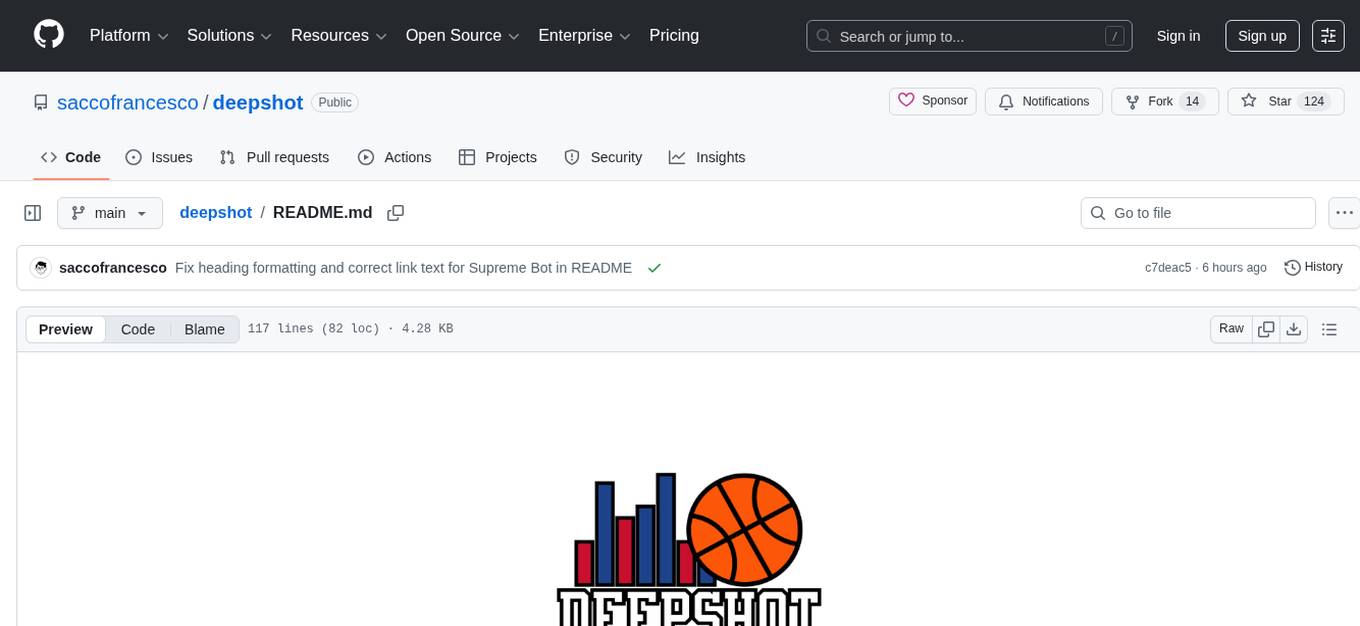
deepshot
DeepShot is an advanced NBA game predictor that utilizes machine learning algorithms and historical data from Basketball Reference to forecast matchups. It stands out by using Exponentially Weighted Moving Averages (EWMA) to capture recent form and momentum, visually highlighting key statistical differences between teams, offering a clean NiceGUI-powered web interface, working locally across platforms, and being based entirely on free and public data.
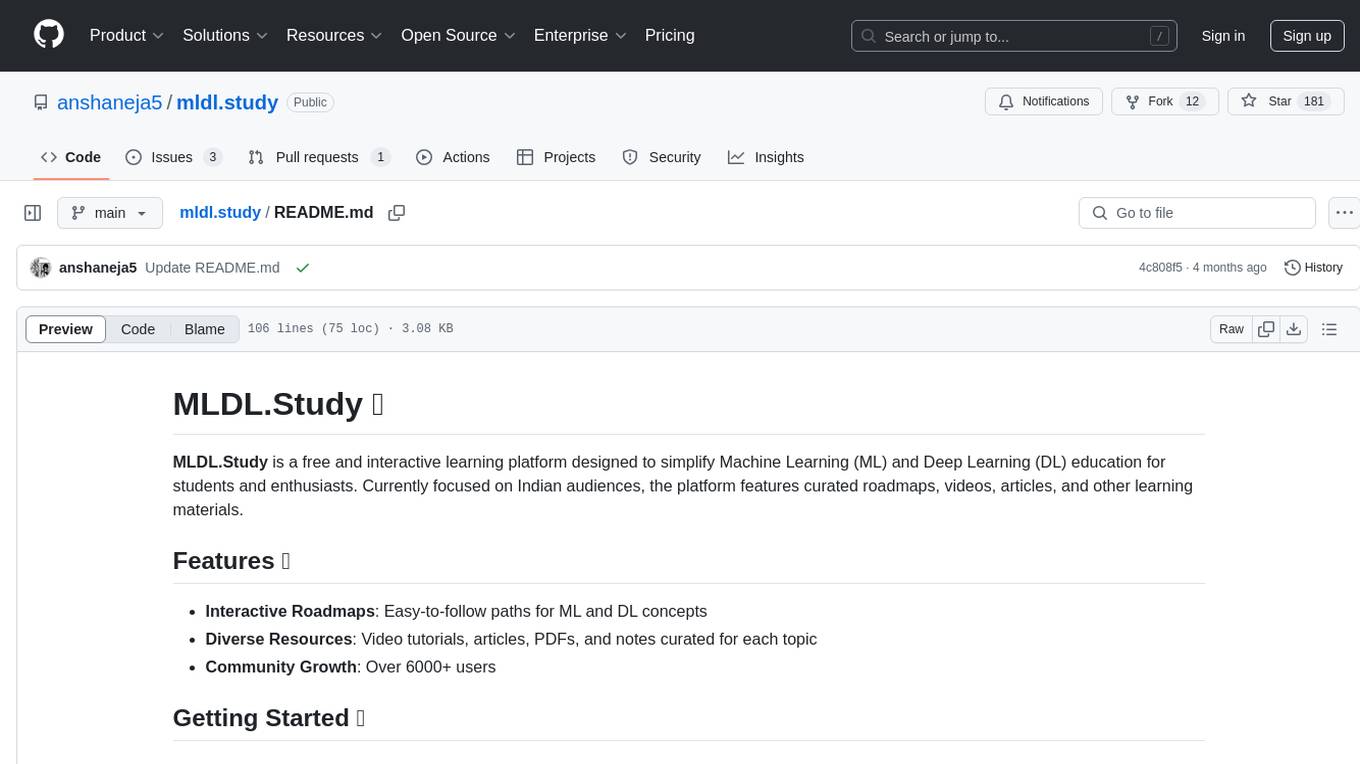
mldl.study
MLDL.Study is a free interactive learning platform focused on simplifying Machine Learning (ML) and Deep Learning (DL) education for students and enthusiasts. It features curated roadmaps, videos, articles, and other learning materials. The platform aims to provide a comprehensive learning experience for Indian audiences, with easy-to-follow paths for ML and DL concepts, diverse resources including video tutorials and articles, and a growing community of over 6000 users. Contributors can add new resources following specific guidelines to maintain quality and relevance. Future plans include expanding content for global learners, introducing a Python programming roadmap, and creating roadmaps for fields like Generative AI and Reinforcement Learning.
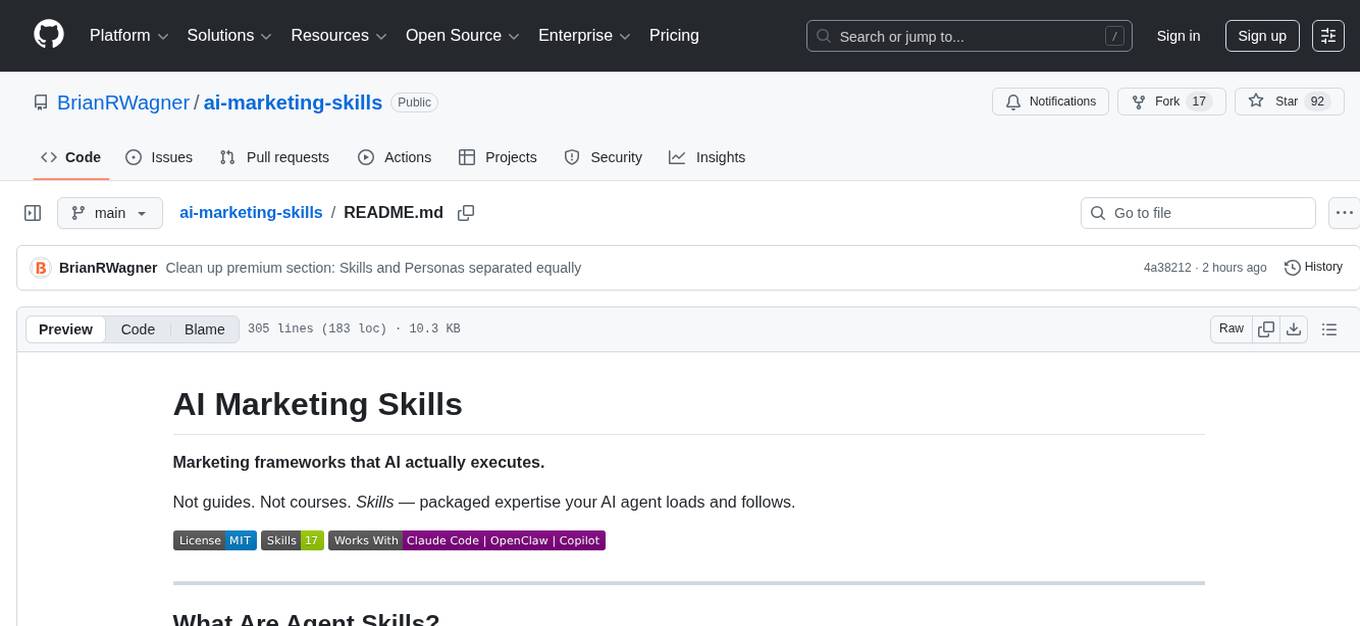
ai-marketing-skills
AI Marketing Skills is a repository containing packaged expertise in the form of agent skills that AI agents can follow. These skills cover various areas such as Strategy & Positioning, Content & Authority, Research & Intelligence, Conversion & Sales, and Productivity & Operations. Users can leverage these skills to execute marketing frameworks effectively through AI technology. The repository provides detailed instructions on how to use these skills with different AI tools and platforms, ensuring seamless integration and activation based on specific keywords.
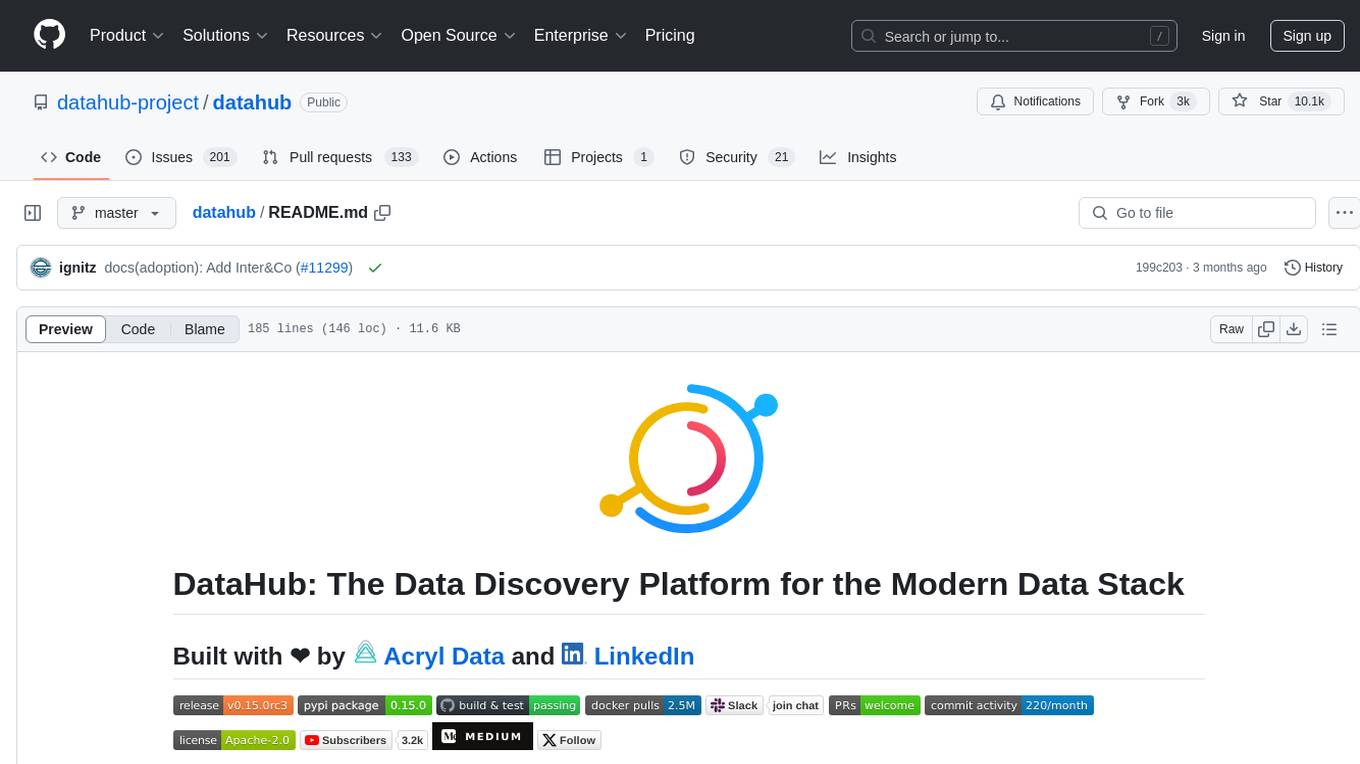
datahub
DataHub is an open-source data catalog designed for the modern data stack. It provides a platform for managing metadata, enabling users to discover, understand, and collaborate on data assets within their organization. DataHub offers features such as data lineage tracking, data quality monitoring, and integration with various data sources. It is built with contributions from Acryl Data and LinkedIn, aiming to streamline data management processes and enhance data discoverability across different teams and departments.
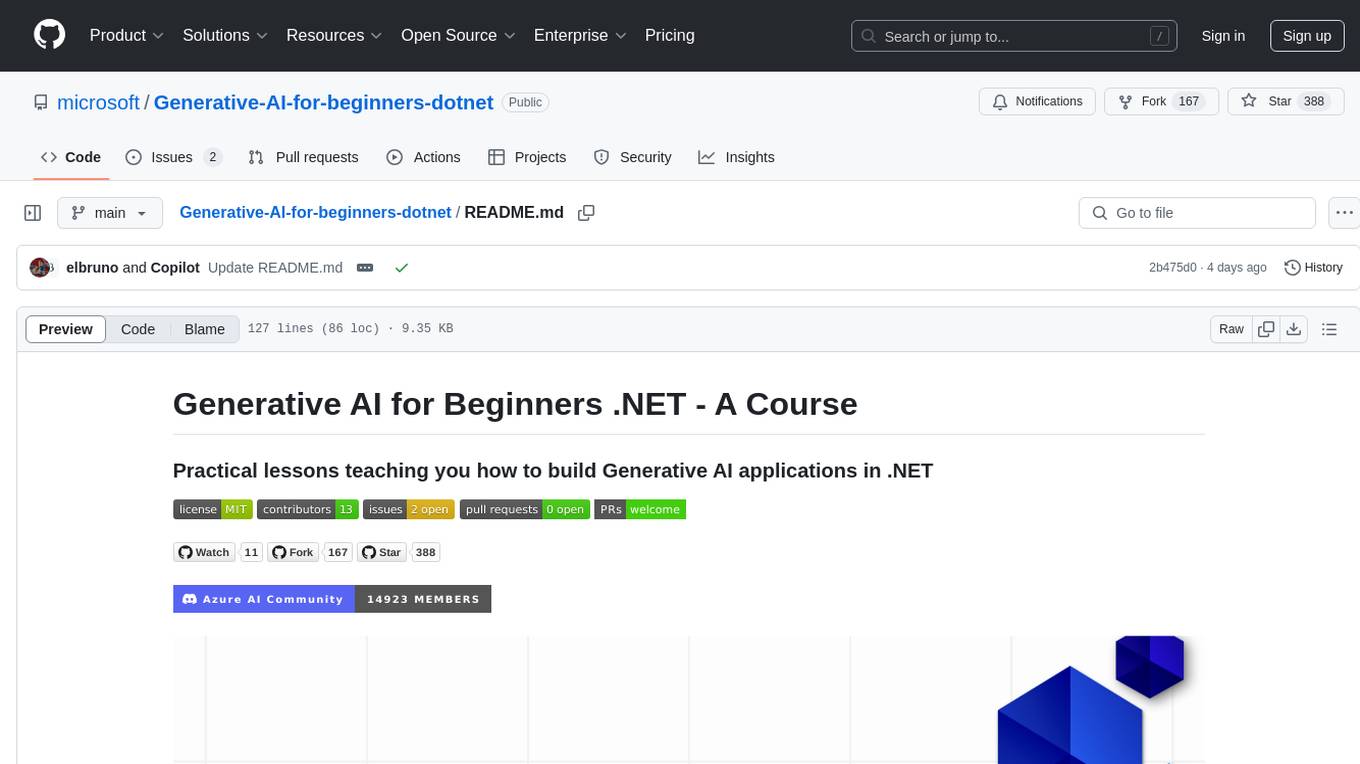
Generative-AI-for-beginners-dotnet
Generative AI for Beginners .NET is a hands-on course designed for .NET developers to learn how to build Generative AI applications. The repository focuses on real-world applications and live coding, providing fully functional code samples and integration with tools like GitHub Codespaces and GitHub Models. Lessons cover topics such as generative models, text generation, multimodal capabilities, and responsible use of Generative AI in .NET apps. The course aims to simplify the journey of implementing Generative AI into .NET projects, offering practical guidance and references for deeper theoretical understanding.
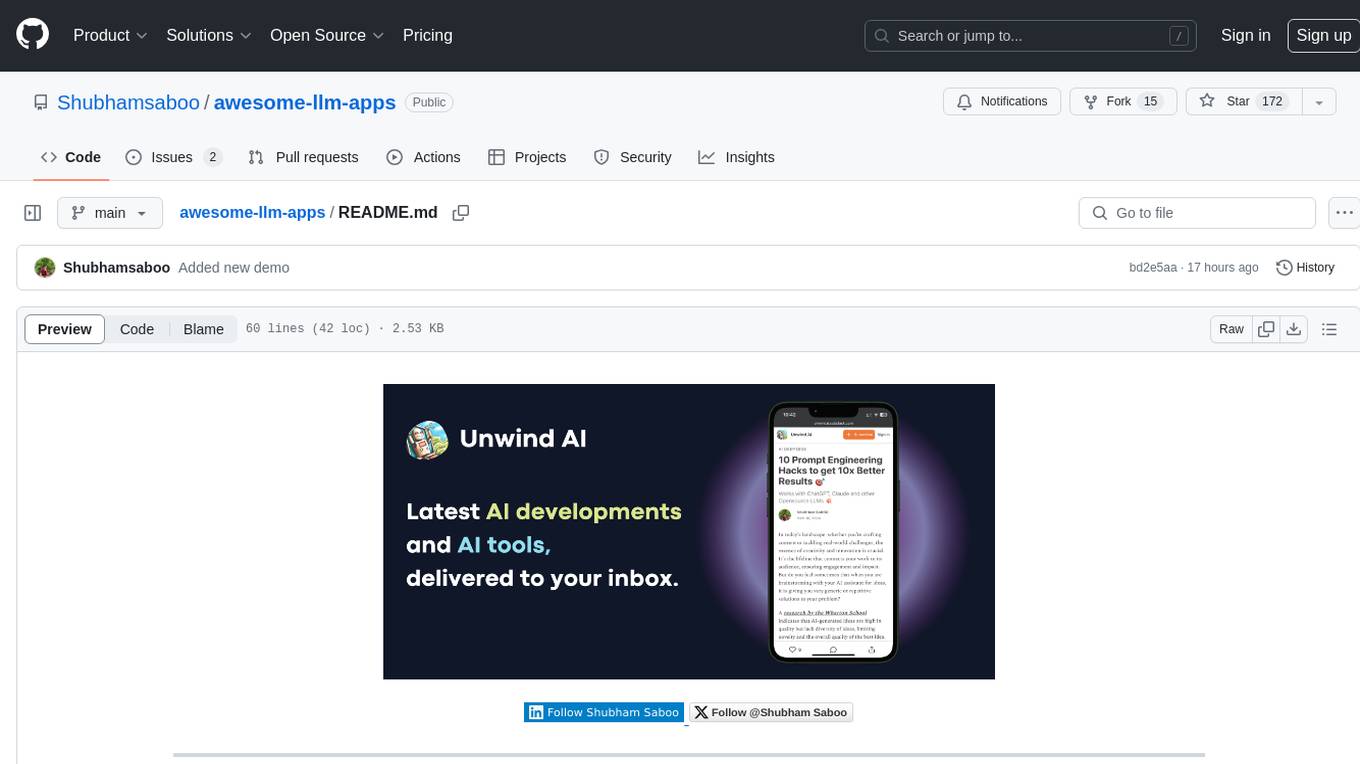
awesome-llm-apps
Awesome LLM Apps is a curated collection of applications that leverage RAG with OpenAI, Anthropic, Gemini, and open-source models. The repository contains projects such as Local Llama-3 with RAG for chatting with webpages locally, Chat with Gmail for interacting with Gmail using natural language, Chat with Substack Newsletter for conversing with Substack newsletters using GPT-4, Chat with PDF for intelligent conversation based on PDF documents, and Chat with YouTube Videos for engaging with YouTube video content through natural language. Users can clone the repository, navigate to specific project directories, install dependencies, and follow project-specific instructions to set up and run the apps. Contributions are encouraged, and new app ideas or improvements can be submitted via pull requests.
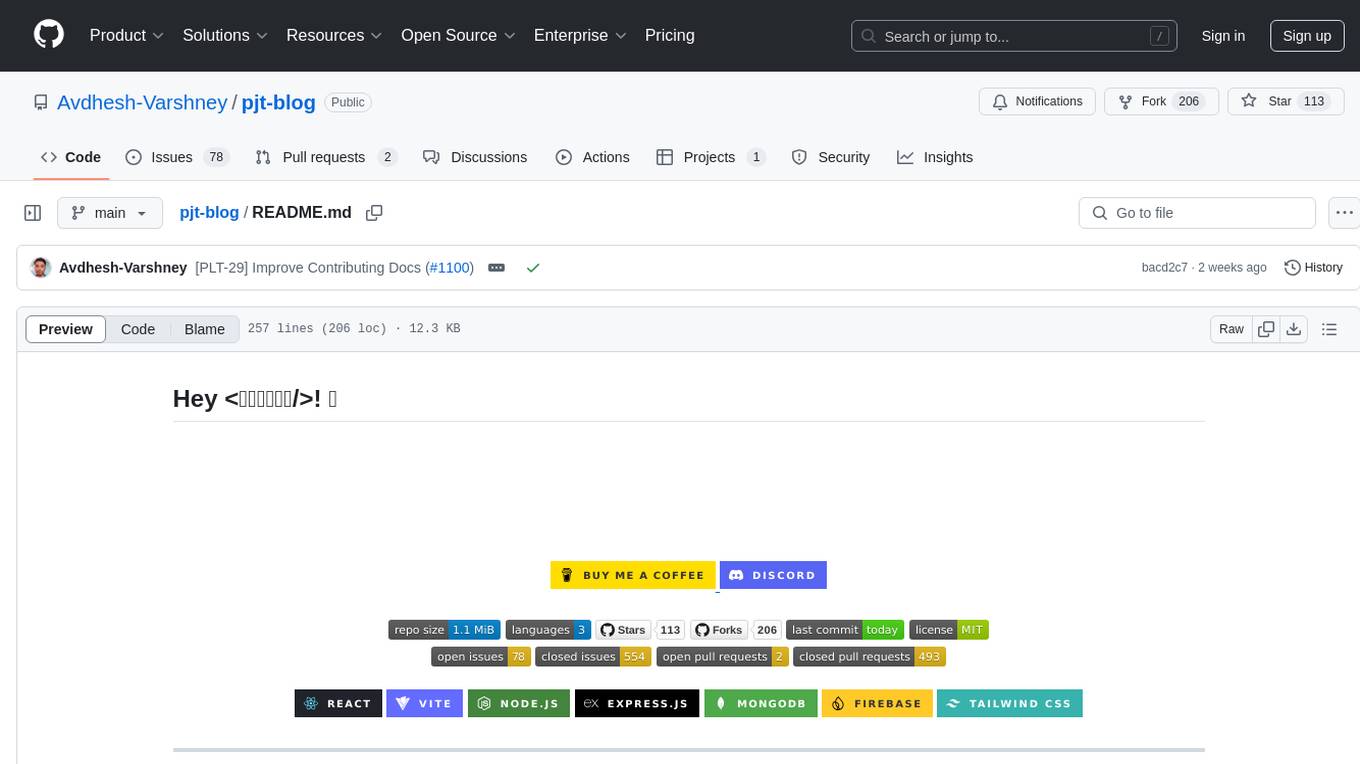
project-blog
Welcome to the Blog Script Project, a collaborative platform for developers and writers to create, manage, and share content. With features like Markdown support, submodule integration, customizable templates, project contribution workflow, global visibility, community discussions, SEO optimization, and role-based dashboard, Blog Script enhances collaboration and visibility for your work. You can contribute by adding new projects, improving existing projects, updating documentation, fixing bugs, optimizing, and ensuring code readability. Follow the contribution guidelines to star the repository, find tasks, fork the repository, make changes, add screenshots, submit a pull request, and contribute to the open-source community. Additionally, you can add your project as a submodule by following the provided guidelines. Join us, contribute, and grow together!
For similar tasks

awesome-ml-blogs
awesome-ml-blogs is a curated list of machine learning technical blogs covering a wide range of topics from research to deployment. It includes blogs from big corporations, MLOps startups, data labeling platforms, universities, community content, personal blogs, synthetic data providers, and more. The repository aims to help individuals stay updated with the latest research breakthroughs and practical tutorials in the field of machine learning.
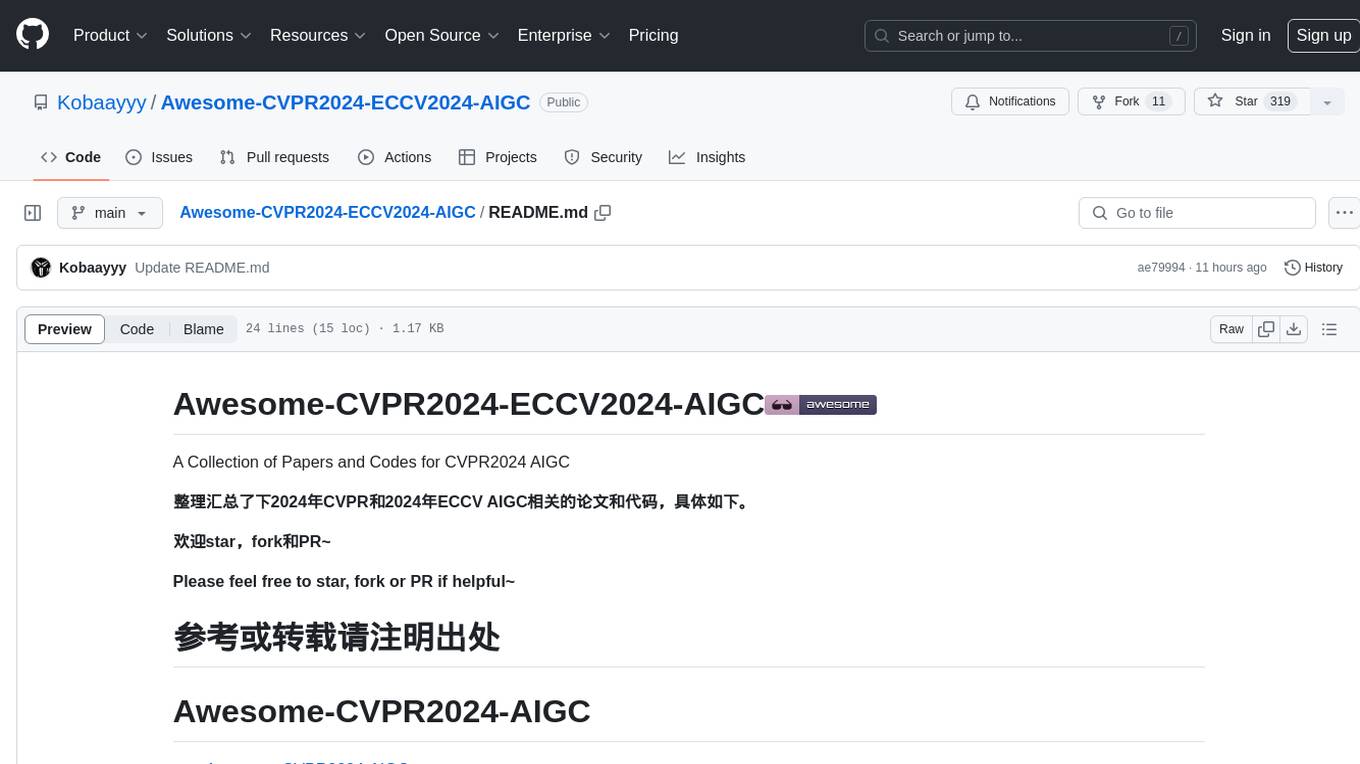
Awesome-CVPR2024-ECCV2024-AIGC
A Collection of Papers and Codes for CVPR 2024 AIGC. This repository compiles and organizes research papers and code related to CVPR 2024 and ECCV 2024 AIGC (Artificial Intelligence and Graphics Computing). It serves as a valuable resource for individuals interested in the latest advancements in the field of computer vision and artificial intelligence. Users can find a curated list of papers and accompanying code repositories for further exploration and research. The repository encourages collaboration and contributions from the community through stars, forks, and pull requests.
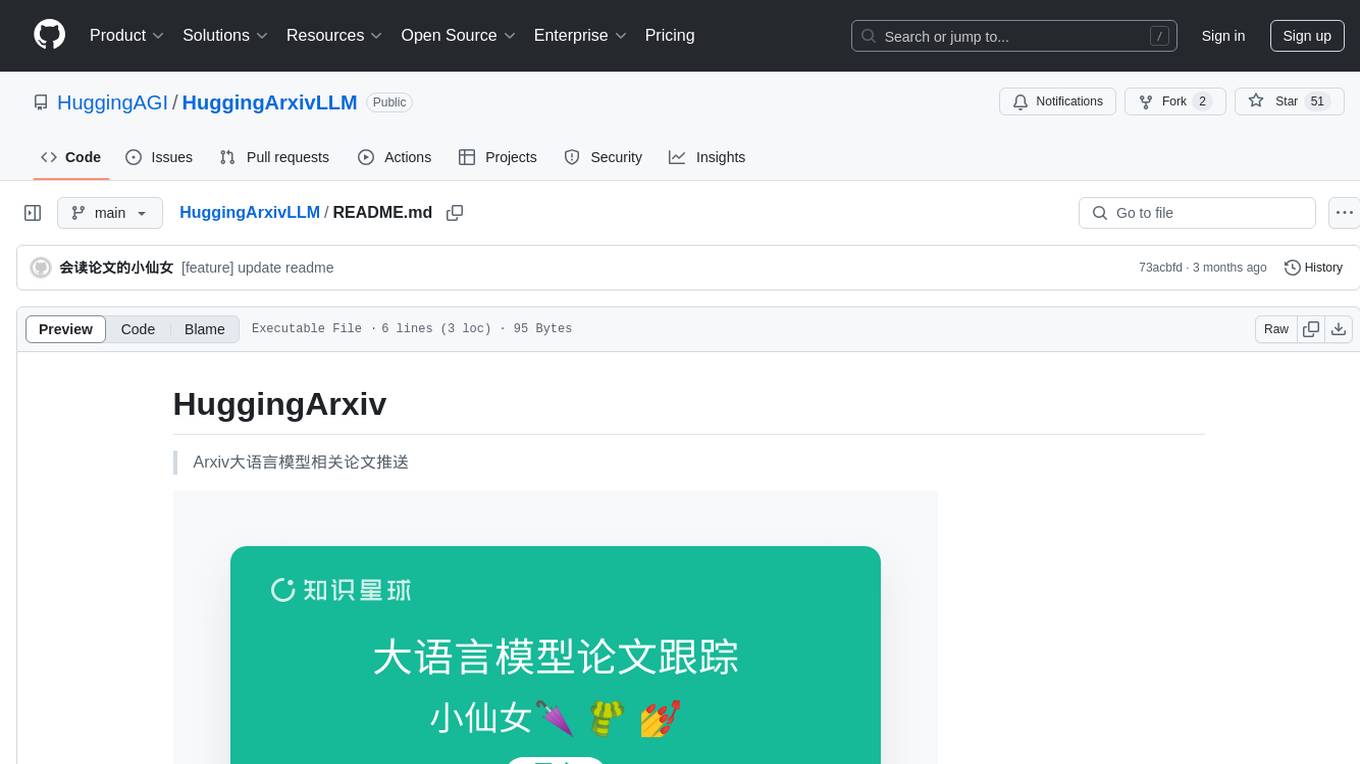
HuggingArxivLLM
HuggingArxiv is a tool designed to push research papers related to large language models from Arxiv. It helps users stay updated with the latest developments in the field of large language models by providing notifications and access to relevant papers.

Awesome-Lists-and-CheatSheets
Awesome-Lists is a curated index of selected resources spanning various fields including programming languages and theories, web and frontend development, server-side development and infrastructure, cloud computing and big data, data science and artificial intelligence, product design, etc. It includes articles, books, courses, examples, open-source projects, and more. The repository categorizes resources according to the knowledge system of different domains, aiming to provide valuable and concise material indexes for readers. Users can explore and learn from a wide range of high-quality resources in a systematic way.
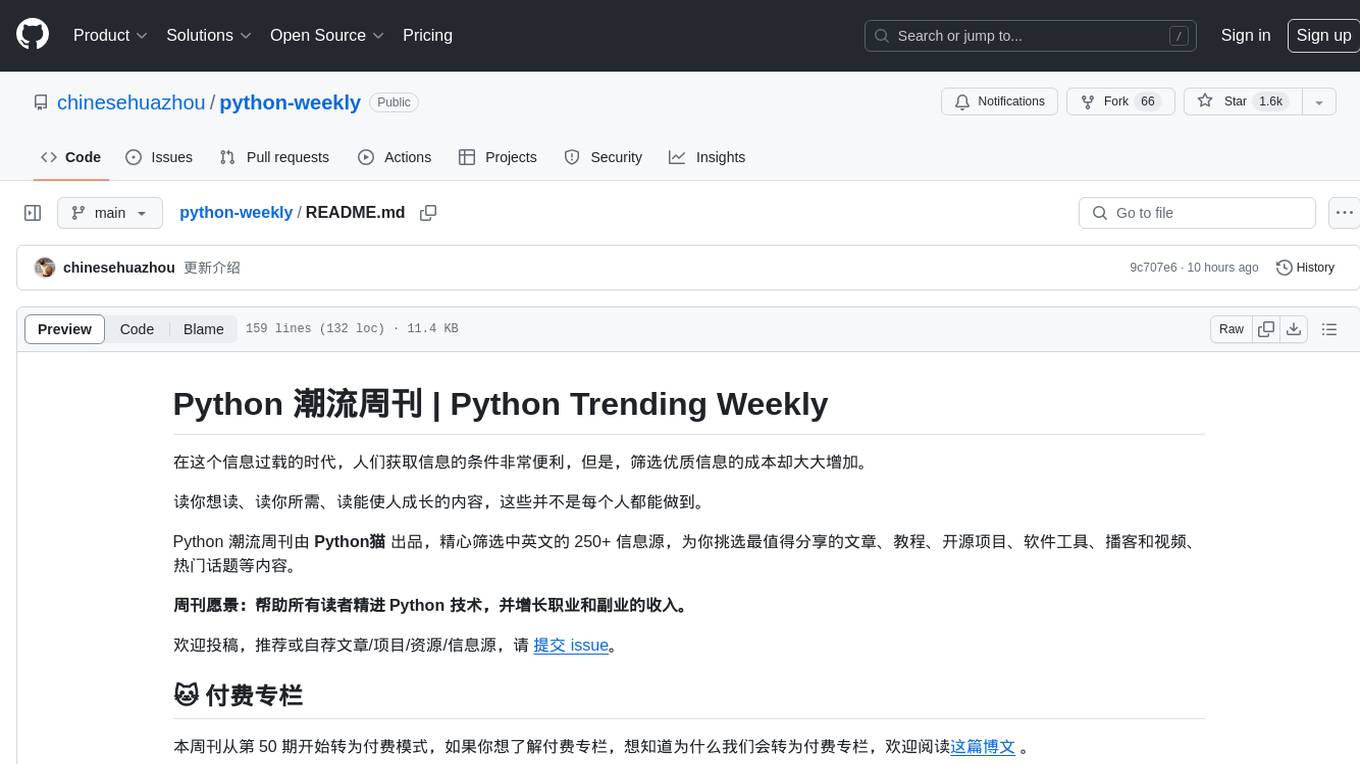
python-weekly
Python Trending Weekly is a curated newsletter by Python猫 that selects the most valuable articles, tutorials, open-source projects, software tools, podcasts, videos, and hot topics from over 250 English and Chinese sources. The newsletter aims to help readers improve their Python skills and increase their income from both professional and side projects. It offers paid subscription options and is available on various platforms like GitHub, WeChat, blogs, email, Telegram, and Twitter. Each issue shares a collection of articles, open-source projects, videos, and books related to Python and technology.
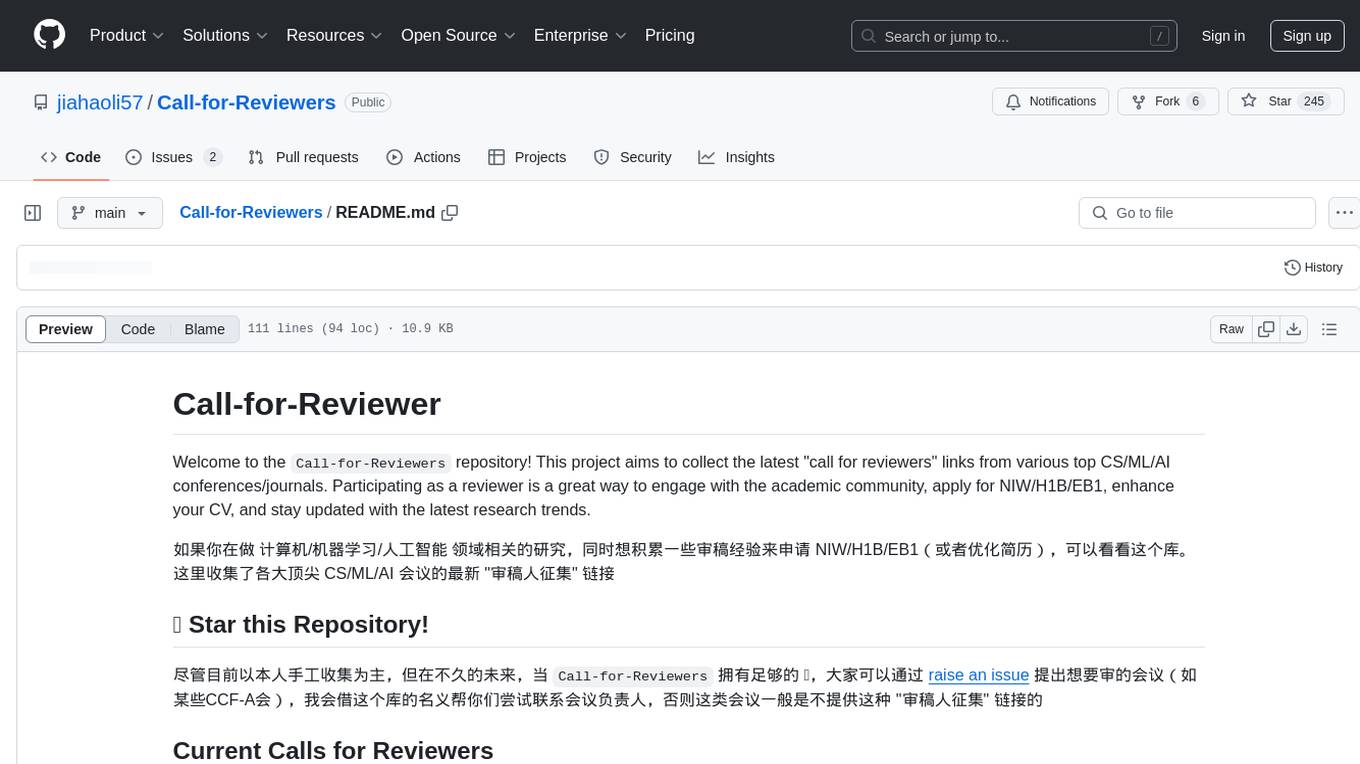
Call-for-Reviewers
The `Call-for-Reviewers` repository aims to collect the latest 'call for reviewers' links from various top CS/ML/AI conferences/journals. It provides an opportunity for individuals in the computer/ machine learning/ artificial intelligence fields to gain review experience for applying for NIW/H1B/EB1 or enhancing their CV. The repository helps users stay updated with the latest research trends and engage with the academic community.
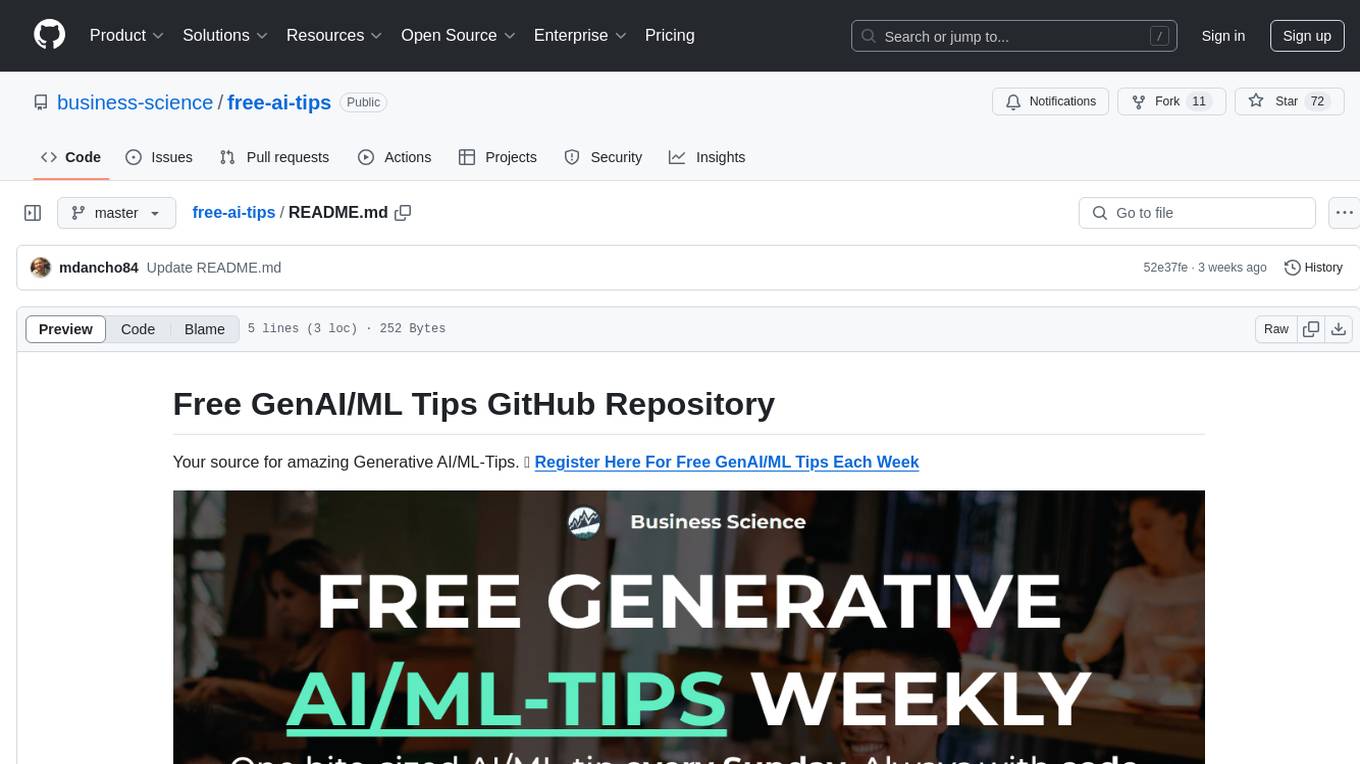
free-ai-tips
Free AI Tips is a GitHub repository that provides weekly tips on Generative AI and Machine Learning. Users can register to receive these tips for free. The repository aims to offer valuable insights and knowledge in the field of AI and ML to help individuals enhance their skills and stay updated with the latest trends and developments.
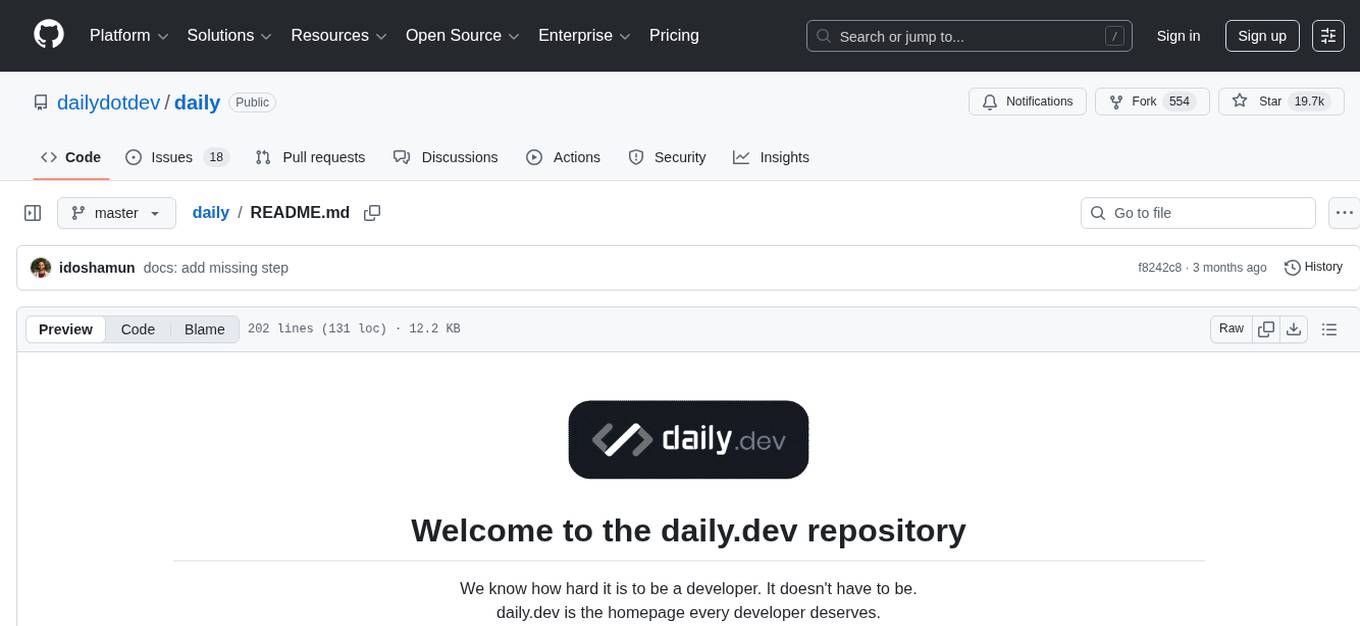
daily
daily.dev is a professional network for developers to learn, collaborate, and grow together. It offers a personalized news feed, dev communities, and search features. The platform aims to help developers stay up-to-date, interact based on the latest trends, and collaborate with other developers. It works offline and is available as a browser extension and a Progressive Web App (PWA). daily.dev is designed to make it easy for developers to navigate abundant content and discover the knowledge they need effortlessly.
For similar jobs

weave
Weave is a toolkit for developing Generative AI applications, built by Weights & Biases. With Weave, you can log and debug language model inputs, outputs, and traces; build rigorous, apples-to-apples evaluations for language model use cases; and organize all the information generated across the LLM workflow, from experimentation to evaluations to production. Weave aims to bring rigor, best-practices, and composability to the inherently experimental process of developing Generative AI software, without introducing cognitive overhead.

LLMStack
LLMStack is a no-code platform for building generative AI agents, workflows, and chatbots. It allows users to connect their own data, internal tools, and GPT-powered models without any coding experience. LLMStack can be deployed to the cloud or on-premise and can be accessed via HTTP API or triggered from Slack or Discord.

VisionCraft
The VisionCraft API is a free API for using over 100 different AI models. From images to sound.

kaito
Kaito is an operator that automates the AI/ML inference model deployment in a Kubernetes cluster. It manages large model files using container images, avoids tuning deployment parameters to fit GPU hardware by providing preset configurations, auto-provisions GPU nodes based on model requirements, and hosts large model images in the public Microsoft Container Registry (MCR) if the license allows. Using Kaito, the workflow of onboarding large AI inference models in Kubernetes is largely simplified.

PyRIT
PyRIT is an open access automation framework designed to empower security professionals and ML engineers to red team foundation models and their applications. It automates AI Red Teaming tasks to allow operators to focus on more complicated and time-consuming tasks and can also identify security harms such as misuse (e.g., malware generation, jailbreaking), and privacy harms (e.g., identity theft). The goal is to allow researchers to have a baseline of how well their model and entire inference pipeline is doing against different harm categories and to be able to compare that baseline to future iterations of their model. This allows them to have empirical data on how well their model is doing today, and detect any degradation of performance based on future improvements.

tabby
Tabby is a self-hosted AI coding assistant, offering an open-source and on-premises alternative to GitHub Copilot. It boasts several key features: * Self-contained, with no need for a DBMS or cloud service. * OpenAPI interface, easy to integrate with existing infrastructure (e.g Cloud IDE). * Supports consumer-grade GPUs.

spear
SPEAR (Simulator for Photorealistic Embodied AI Research) is a powerful tool for training embodied agents. It features 300 unique virtual indoor environments with 2,566 unique rooms and 17,234 unique objects that can be manipulated individually. Each environment is designed by a professional artist and features detailed geometry, photorealistic materials, and a unique floor plan and object layout. SPEAR is implemented as Unreal Engine assets and provides an OpenAI Gym interface for interacting with the environments via Python.

Magick
Magick is a groundbreaking visual AIDE (Artificial Intelligence Development Environment) for no-code data pipelines and multimodal agents. Magick can connect to other services and comes with nodes and templates well-suited for intelligent agents, chatbots, complex reasoning systems and realistic characters.